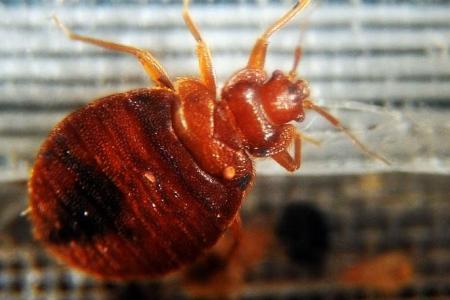Bedbugs: What you need to know for worry-free travel
From Paris to London, then Seoul and Hong Kong. No, this is not the glittery lifestyle of a jet-setting supermodel, but the scourge of bedbugs spreading across the globe.
Following reports of bedbug infestations in South Korea, France and Britain, people in Hong Kong are reportedly buying insect killers and hiring pest control services.
This, after the city’s rail operator MTR carried out a deep cleaning of some of its trains, following a widely-shared photo of a brown, oval-shaped insect on an Airport Express train seat.
Bedbug hitch-hikers, travellers’ nightmare
Resembling apple seeds, these tiny and wingless pests are just 5mm-long. Spotting one can be very tricky since they are most active at night.
Bedbug bites do not transmit diseases, but causes severe itching, said Singapore’s national health platform HealthHub.
Their bites are extremely itchy and recognisable as clusters of red bumps on areas on the body that are usually not covered up, such as the neck, arms and legs.
According to HealthHub, many patients do not seek formal medical treatment, thus the exact number of bedbug cases in Singapore is unclear as patients rarely develop complications as the itchiness may eventually subside.
Travellers beware
Travel agencies here are taking steps to handle and tackle any bedbug issues.
Travel operator Chan Brothers Travel’s senior marketing communications manager Jeremiah Wong said that none of their tour groups have reported issues with bedbugs so far.
But they have implemented several measures to protect its travellers; for example, its bus drivers at the destinations would “heightened their daily cleaning and disinfection of coaches”.
Also, any traveller who suspects that he or she had been bitten by bedbugs during the trip would have their rooms changed and be accompanied to the doctor for treatment.
“We also encourage all our travellers to purchase travel insurance to cover any exigency if the need arises,” said Mr Wong.
Similarly, Dreamcation Cruises and Tours said it is not taking any chances, though none of its clients have reported issues with bedbugs so far.
“As part of our proactive measures, we ensure strict safety precautions, sanitising all luggages before boarding our buses and checking in to hotels. If there’s any suspicion about a specific piece of luggage, our team will isolate it immediately,” explained the travel agency.
The isolated luggage then undergoes a thorough inspection and cleaning process to minimise any potential impact on other travellers, Dreamcation added.
“The travel packages include medical coverage. In the event of any health concerns, including those related to bedbugs, affected individuals can claim medical expenses of their health concerns”, it said.
The prospect of being bitten by bedbugs while travelling has deterred avid traveller Nur Illazabella, who had wanted to visit Paris this year.
“I’d rather wait for the bedbug wave to dissipate completely. Better wait than be sorry,” said the 27-year-old, adding that she would visit the French capital in mid-2024 instead.
Ms Nisha Suni, who is currently on vacation in London and Manchester, said she is worried about the bedbug situation, especially with the train system there as bedbugs could be hiding in the cushioned seats on the trains.
As a precaution, the 33-year-old checks her clothes every time after she returns to her hotel, and avoids sitting in the Tube as much as possible.
But some travellers, like Ms Lisdiawaty Mansjur, are more relaxed about the bedbug situation.
“We shall try to look out for seats in trains that are made from cloth and avoid sitting on them,” the 45-year-old said.
She will be travelling, with her husband, to London for the first time at the start of December and is unfazed by the bedbug wave in recent months.
Ms Lisdiawaty shared that she would be bringing only ointments should they be bitten by bedbugs.
Bedbugs biting the dust
As bedbug bites usually do not pose a serious medical threat, the best way to treat a bite is to avoid scratching the area and apply antiseptic creams or lotions, the United States Centres for Disease Control and Prevention (CDC) said.
The CDC added that the best way to prevent bedbugs is regular inspection for any signs of an infestation, such as the seams and folds of luggage, overnight bags, folded clothes and bedding.
Aardwolf Pestkare, a pest management provider in Singapore, said: “There will be tell-tale signs such as black spots left behind by the bedbugs, or the exoskeletons of bedbugs on fabric items such as bedsheets and pillows.”
Travellers can also look at several ways to prevent bringing home bedbugs from their overseas trips.
“They may consider using BugZip luggage encasements, which can stop bedbugs from entering the luggage. On returning home, luggage should be inspected and kept isolated from the bedroom,” added Aardwolf Pestkare.
Although it is advisable to check surroundings for any sign of infestation or even using common insect repellent (DEET) while travelling to ward off bedbugs, PestBusters advised travellers to wash their clothing in hot water as extreme heat will kill the insect and its eggs.
PestBusters recommends doing basic laundry with hot water first as a preventative measure. Then, hanging the clothes under hot weather would help, too, as it irritates the insect.
Bedbugs are “difficult to control”, said Aardwolf Pestkare, hence “a pest management professional should be consulted”.
Get The New Paper on your phone with the free TNP app. Download from the Apple App Store or Google Play Store now


